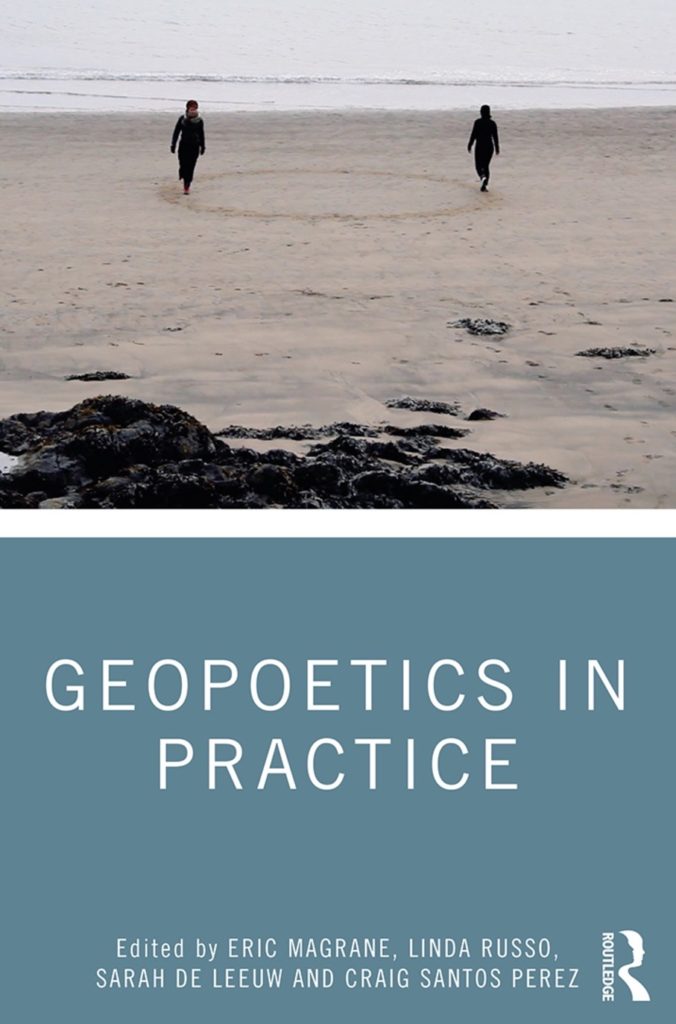Bioscience article on Art-Sci collaborations
“6&6: A Transdisciplinary Approach to Art–Science Collaboration,” an article about our project that brought 6 artists and 6 scientists together for art-sci collaboration around the Sonoran Desert and Gulf of California, is now published in Bioscience.
Climate Poem at “Writing Out Of Time” blog
Thanks to Joseph Harrington, who featured a poem of mine in his Writing Out Of Time creative writing & climate chaos blog.
Climate Geopoetics article in Dialogues in Human Geography
The “online first” version of a new article, “Climate geopoetics (the earth is a composted poem)” is published in Dialogues in Human Geography. See the abstract and article here.
Geopoetics in Practice
Geopoetics in Practice is published! You can read more about the book, which is in the Routledge Research in Culture, Space, and Identity series, here.
A poem in Carbon Copy: a new journal of climate science and the literary arts
The new journal Carbon Copy bills itself as “a journal at the intersection of climate science and the literary arts.” I’m grateful to have a poem in its inaugural issue. The poem is titled “In the Anthropocene, there can be no climate in the old sense; only weathercultures, with people acting as weatherculturalists.” The poem’s title is a direct quote from Mike Hulme, from his book Weathered: Cultures of Climate.
You can find the journal’s homepage here, and the poem here.
Various Instructions
Thanks to Anna Lena Phillips Bell, editor of Ecotone, for reprinting “Various Instructions for the Practice of Poetic Field Research” in Ecotone’s Spring/Summer 2019 issue.
Anna Lena writes, “With this issue we debut a new department, Various Instructions, in which writers and artists will offer lists, prompts, formulas, how-to’s, and the like. We’re reprinting here the inspiration for it: Eric Magrane’s ‘Various Instructions for the Practice of Poetic Field Research.”
You can read “Various Instructions for the Practice of Poetic Field Research” here, and Anna Lena’s “Venerable Instructions,” where she introduces the new department of the journal, here.
Two for Antipode
Sarah de Leeuw and I wrote a chapter on geopoetics for Antipode’s new book Keywords in Radical Geography: Antipode at 50. The whole book is free to access and download here.
Also in Antipode: I recently reviewed the book Ecopoetics: Essays in the Field (University of Iowa Press, 2018), edited by Angela Hume and Gillian Osborne. The review is available here.
Applying the Geohumanities
My article “Applying the Geohumanities” has been published in the International Journal of Applied Geospatial Research. The article is part of a special issue on applied geography in academia, edited by my NMSU colleague Micheal DeMers.
Here is the abstract:
In recent years, geography has taken up a renewed engagement with humanities approaches to place, space, and environment. These approaches offer new possibilities for relevant, publicly engaged research and teaching; applying the geohumanities expands the techniques that geographers can employ to do engaged work in the face of great social and environmental challenges. This article describes two examples of applied geohumanities projects: a community course on climate change and poetry and a creative approach to a citizen science bioblitz. Building on these examples, four questions for future work in applied geohumanities are posed.
New article in Literary Geographies
My article ‘Healing, Belonging, Resistance, and Mutual Care’: Reading Indigenous Ecopoetics and Climate Narratives has been published in the new issue of the online open-access journal Literary Geographies. View the pdf here.
Here is the article’s abstract:
Narratives of climate change place it alternately as an environmental justice issue, a national and global security issue, an apocalyptic threat to life on earth, an opportunity for social change, and more. In this article, I aim to bring critical geographic work on climate narratives into conversation with contemporary poetry, through close readings of specific poems. I argue that the work of contemporary poets, and in particular the work of Indigenous ecopoetics, is rich in poetic texts that offer imaginative practices for recalibrating climate change narratives. I look particularly to works by Craig Santos Perez, Kathy Jetn̄il-Kijiner, Allison Adelle Hedge Coke, Joy Harjo, and Linda Hogan. I approach the poems as both a critical geographer and as a poet, thinking through and with their form and content in relation to climate narratives, and in relation to a description of Indigenous ecopoetics by Perez. I meet these poems as stored energy, as actors themselves in a human and more-than-human collective. A close reading of the craft of creative texts—particularly to the level of the line in poetry—highlights the inextricable connection between form and content in how a poem acts and means in the world. As a non-Indigenous reader of texts by Indigenous poets, my goal is not to perform a ‘master’ reading or analysis of these texts, but rather to learn from the poems and in doing so attempt to decolonize my own thought, a process that is a constant practice.

